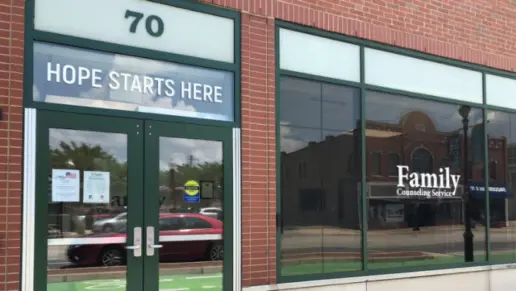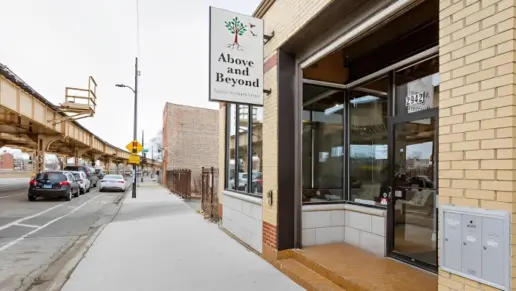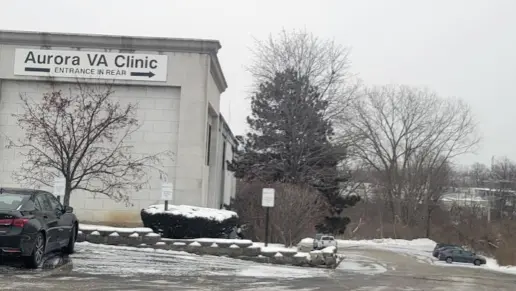I did read reviews before going to NW CDH BHS and some did make me nervous. But here is the thing - and its a cliche but cliches are cliches because they are true - you only get out of it what you put into it. If you don't want to be there / aren't there by choice, there is ...
About Northwestern Medicine Behavioral Health Services Winfield
Northwestern Medicine CDH Behavioral Health Services offers alcohol and drug addiction treatment and mental health support for adults and adolescents in Winfield, Illinois. They also provide valuable community resources, case management, behavioral health programs, and psychiatric subspecialties.
Addiction related services offered at Northwestern Medicine CDH Behavioral Health Services include psychological testing, counseling, co-occurring services for adults, intensive outpatient programming, residential substance use disorder treatment, couples and family support, and transcranial magnetic stimulation.
Psychological assessments are evaluations conducted by clinicians to help to identify symptoms of substance use disorders and/or co-occurring mental health conditions, like anxiety. Following an assessment, the clinician will create a treatment plan which may include individual counseling, group therapy, psychoeducation, motivational interviewing, cognitive behavioral therapy, motivational enhancement therapy, family counseling, and medication management.
The outpatient clinic at Northwestern Medicine CDH Behavioral Health Services treats substance use disorders and/or other co-occurring conditions (known as dual diagnosis). Services include a psychological assessment and individualized treatment plan, individual and group therapy, psychoeducation, relapse prevention support and planning, and recovery support groups. A patient should expect to attend anywhere from one to three times per week, depending upon the severity of their conditions and individual circumstances.
The intensive outpatient program (IOP) at Northwestern Medicine CDH Behavioral Health Services is for those who want or need a structured treatment program but have work, school, or family obligations. IOP programs vary in duration and intensity depending on the individual’s circumstances, severity of addiction, and outside resources.
Northwestern Medicine CDH Behavioral Health offers an inpatient, or residential, treatment program for adults over the age of 18. Stays at the treatment facility last for a minimum of 30 days and involve meeting with a clinician who conducts a behavioral health assessment. The treatment team then creates individualized treatment plans and may recommend the participant engage in evidence-based therapies to treat addiction and mental health conditions, like motivational interviewing, individual and group counseling, psychoeducation, and relapse prevention.
TMS is an innovative therapy offered to individuals with depression who have not been responsive to medication. Administered by a psychiatrist, TMS uses magnetic pulses to stimulate nerve cells in the brain, which is thought to relieve symptoms of depression.
Northwestern Medicine CDH Behavioral Health Services accepts Medicaid, Medicare, Tricare, most commercial insurance plans, EAP, and self-pay. Financing and financial aid options are also available.
Facility Overview
Latest Reviews
Rehab Score
Gallery
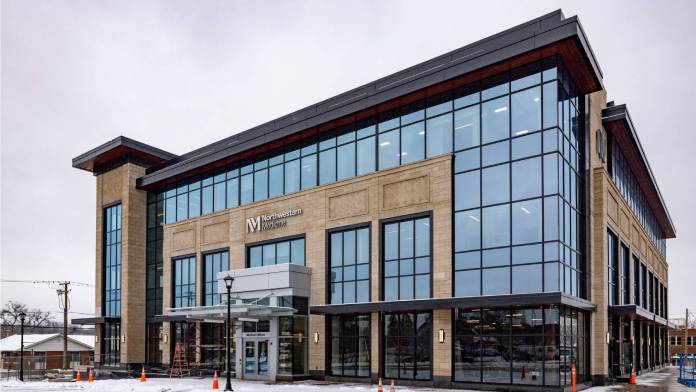
Location
Accepted Insurance





Other Forms of Payment
Medicaid is a state based program that helps lower-income individuals and families pay for healthcare. Medicaid covers addiction treatment so those enrolled can use their coverage to pay for rehab. When a program accepts Medicaid the client often pays very little or nothing out of their own pocket.
Private insurance refers to any kind of healthcare coverage that isn't from the state or federal government. This includes individual and family plans offered by an employer or purchased from the Insurance Marketplace. Every plan will have different requirements and out of pocket costs so be sure to get the full details before you start treatment.
Self-pay involves paying for treatment out of your own pocket. You can use savings or credit, get a personal loan, or receive help from family and friends to fund your treatment. If you don't have insurance or your insurance plan doesn't cover a specific program, self-pay can help ensure you still get the care you need.
Medicare is a federal program that provides health insurance for those 65 and older. It also serves people under 65 with chronic and disabling health challenges. To use Medicare for addiction treatment you need to find a program that accepts Medicare and is in network with your plan. Out of pocket costs and preauthorization requirements vary, so always check with your provider.
Financial aid can take many forms. Centers may have grants or scholarships available to clients who meet eligibility requirements. Programs that receive SAMHSA grants may have financial aid available for those who need treatment as well. Grants and scholarships can help you pai for treatment without having to repay.
Military members, veterans, and eligible dependents have access to specific insurance programs that help them get the care they need. TRICARE and VA insurance can help you access low cost or no cost addiction and mental health treatment. Programs that accept military insurance often have targeted treatment focused on the unique challenges military members, veterans, and their families face.
Addiction Treatments
Levels of Care
Treatments
The goal of treatment for alcoholism is abstinence. Those with poor social support, poor motivation, or psychiatric disorders tend to relapse within a few years of treatment. For these people, success is measured by longer periods of abstinence, reduced use of alcohol, better health, and improved social functioning. Recovery and Maintenance are usually based on 12 step programs and AA meetings.
Drug rehab in Illinois is designed to help people recover from addiction to a number of substances. The length of each program and its intensity tend to vary, and the plan of care is based on your individual needs.
Many of those suffering from addiction also suffer from mental or emotional illnesses like schizophrenia, bipolar disorder, depression, or anxiety disorders. Rehab and other substance abuse facilities treating those with a dual diagnosis or co-occurring disorder administer psychiatric treatment to address the person's mental health issue in addition to drug and alcohol rehabilitation.
A combined mental health and substance abuse rehab has the staff and resources available to handle individuals with both mental health and substance abuse issues. It can be challenging to determine where a specific symptom stems from (a mental health issue or an issue related to substance abuse), so mental health and substance abuse professionals are helpful in detangling symptoms and keeping treatment on track.
Opioid rehabs specialize in supporting those recovering from opioid addiction. They treat those suffering from addiction to illegal opioids like heroin, as well as prescription drugs like oxycodone. These centers typically combine both physical as well as mental and emotional support to help stop addiction. Physical support often includes medical detox and subsequent medical support (including medication), and mental support includes in-depth therapy to address the underlying causes of addiction.
Programs


Clinical Services
Cognitive Behavioral Therapy (CBT) is a therapy modality that focuses on the relationship between one's thoughts, feelings, and behaviors. It is used to establish and allow for healthy responses to thoughts and feelings (instead of unhealthy responses, like using drugs or alcohol). CBT has been proven effective for recovering addicts of all kinds, and is used to strengthen a patient's own self-awareness and ability to self-regulate. CBT allows individuals to monitor their own emotional state, become more adept at communicating with others, and manage stress without needing to engage in substance abuse.
Whether a marriage or other committed relationship, an intimate partnership is one of the most important aspects of a person's life. Drug and alcohol addiction affects both members of a couple in deep and meaningful ways, as does rehab and recovery. Couples therapy and other couples-focused treatment programs are significant parts of exploring triggers of addiction, as well as learning how to build healthy patterns to support ongoing sobriety.
Experiential therapy is a form of therapy in which clients are encouraged to surface and work through subconscious issues by engaging in real-time experiences. Experiential therapy departs from traditional talk therapy by involving the body, and having clients engage in activities, movements, and physical and emotional expression. This can involve role-play or using props (which can include other people). Experiential therapy can help people process trauma, memories, and emotion quickly, deeply, and in a lasting fashion, leading to substantial and impactful healing.
Research clearly demonstrates that recovery is far more successful and sustainable when loved ones like family members participate in rehab and substance abuse treatment. Genetic factors may be at play when it comes to drug and alcohol addiction, as well as mental health issues. Family dynamics often play a critical role in addiction triggers, and if properly educated, family members can be a strong source of support when it comes to rehabilitation.
Group therapy is any therapeutic work that happens in a group (not one-on-one). There are a number of different group therapy modalities, including support groups, experiential therapy, psycho-education, and more. Group therapy involves treatment as well as processing interaction between group members.
In individual therapy, a patient meets one-on-one with a trained psychologist or counselor. Therapy is a pivotal part of effective substance abuse treatment, as it often covers root causes of addiction, including challenges faced by the patient in their social, family, and work/school life.
Life skills trainings involve all the skills a person must have in order to function successfully in the world. These include time management, career guidance, money management, and effective communication. Truly successful addiction recovery is based on the ability to not only live substance-free, but to thrive. Life skills teaches the practical necessities of functioning in society, which sets clients up for success in life, and therefore sobriety.
Nutrition therapy, aka medical nutrition therapy (MNT), is a way of treating physical, emotional, and medical conditions through diet. Specific dietary plans are designed by professional nutritionists or registered dietitians, and patients follow them in order to positively affect their physical and mental health.
Trauma therapy addresses traumatic incidents from a client's past that are likely affecting their present-day experience. Trauma is often one of the primary triggers and potential causes of addiction, and can stem from child sexual abuse, domestic violence, having a parent with a mental illness, losing one or both parents at a young age, teenage or adult sexual assault, or any number of other factors. The purpose of trauma therapy is to allow a patient to process trauma and move through and past it, with the help of trained and compassionate mental health professionals.
Amenities
-
Yoga Studio
Staff & Accreditations
Staff
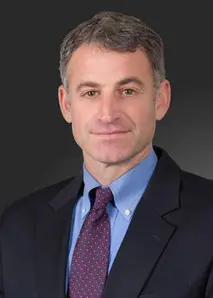
President and CEO

Executive VP and Chief Operating Officer
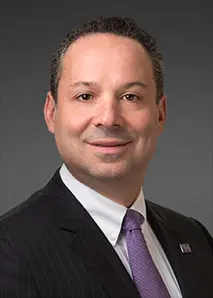
Executive Vice President and CFO
Accreditations

The Joint Commission, formerly known as JCAHO, is a nonprofit organization that accredits rehab organizations and programs. Founded in 1951, the Joint Commision's mission is to improve the quality of patient care and demonstrating the quality of patient care.
Joint Commission Accreditation: Yes
Contact Information
27W350 Highlake Road
Winfield, IL 60190









